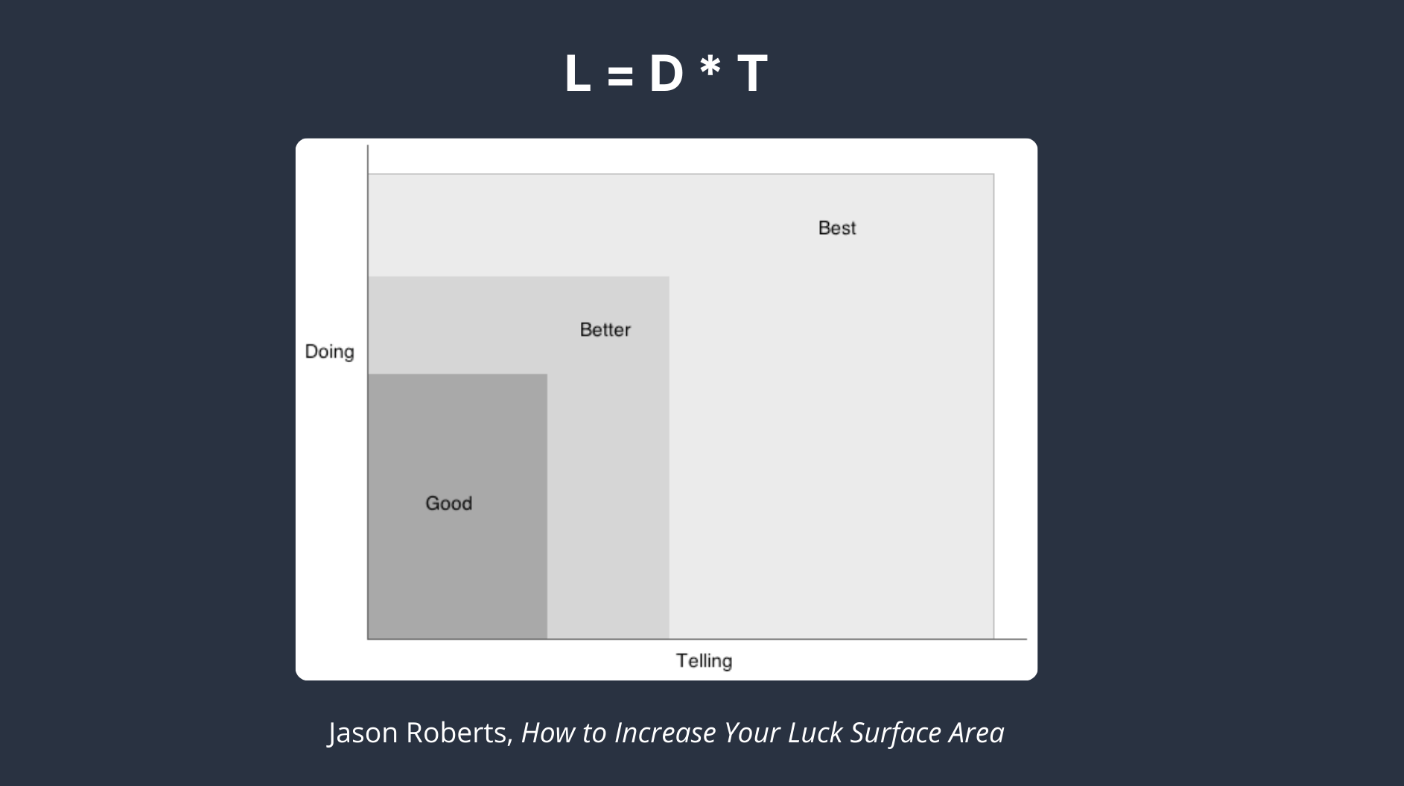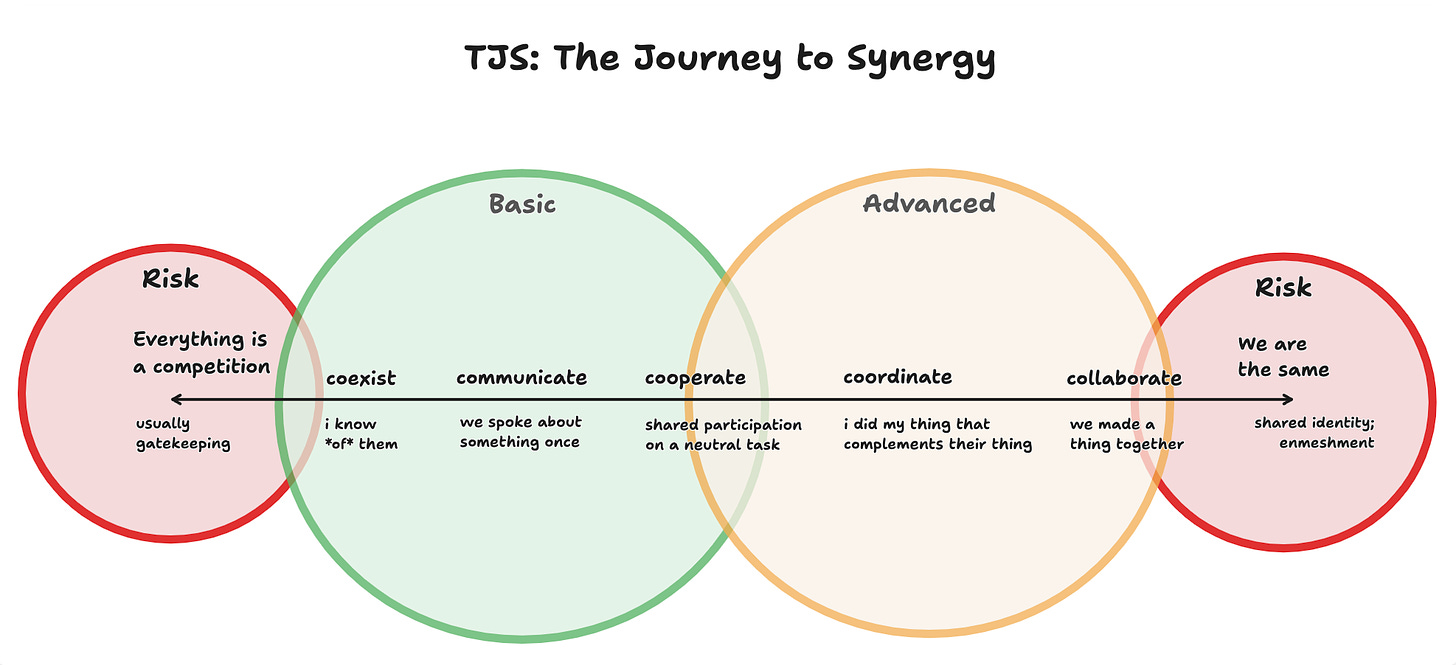[[resultsTitle]]
26 items in NETWORKING

Issue #430 published 5 Jan 2025
How to Grow Professional Relationships
NETWORKING

Issue #426 published 8 Dec 2024
The Traitorous Eight & the PayPal Mafia
NETWORKING
Ethan Mollick is maybe my favourite person to follow on Twitter. His genre is to crunch down unreadable reports in mini-threads, always ensuring to do deliver ‘bottom line, up front’ in the first tweet. This one of the influence of two networks, which have seeded both the semiconductor industry, and the software descendent in the Silicon Valley. The power of networking or the power of social proofing? Maybe facets of the same thing. Follow Ethan and have a read.
Issue #318 published 17 Nov 2022

The Conference Katamari
NETWORKING
So as we’re getting back into doing in-person in 2022, we might as well get better at organising the most the important part of the conference scene - the before / after place for dinner! Simple post, simple answer - optimal number at table is SIX!
Issue #286 published 3 Apr 2022

The legend that is Bill Boorman joins Australia’s No1 recruiting podcast to talk about ‘extreme networking’. Bill has spent the pandemic out of the spotlight, working tirelessly with homeless communities to provide better lives. He’s learned a few recruiting lessons along the way though, which he shares in this awesome conversation
Issue #282 published 6 Mar 2022

So the engineering blog on LinkedIn is one of the most interesting publications on the platform because of the fascinating inferences we can draw from it. Check out their latest post here, on how to optimally build your professional network (hot tip: watch the ratio of coworker connections with connections of people you don’t work with). A bit technical so LinkedIn’s Head of Social’s has written a blog post on recommended actions, here
Issue #241 published 23 May 2021

The Network Liquidity Map: Why Time Matters
NETWORKING
Why networking sometimes can’t be optimised. Superb reading on the sometimes nebulous topic of networking. Relevant to us especially in this period where pandemic is still with us and in-person - in this formulation, a proxy for time - is not available to us.
Issue #220 published 27 Dec 2020

Wonderful post by brainfooder Erin Mathew, lamenting this years absence of the in-person conference. The emerging themes from Erin’s post and the conversation it stimulated was this: in person conference provide the ultimate immersive experience. Have a read here - and roll on 2021!
Issue #219 published 20 Dec 2020

The Network Liquidity Map: Why Time Matters
NETWORKING
Want to build community? Then you really need to read this. Learn about the difference between synchronous vs asynchronous networks, network liquidity and the problem of overcoming ‘spontaneous togetherness’.
Issue #206 published 20 Sep 2020

LinkedOut: The 7 Stages Of Grieving
NETWORKING
Last week it seemed a lot of prolific and prominent users of LinkedIn had their accounts restricted or blocked, for reasons unknown. Brainfooder favourite Kasia Borowicz was among them - her story here tells us a great deal about power in relationships, and how tough it is to be the weaker party. Story continues here and here (PS: Kasia got her account back following a minor public outcry)
Issue #66 published 23 Apr 2020

How to Make Connections That Count
NETWORKING
Superb interview transcript with networking guru Karen Wickre - complete with templates, tactics and how-to’s which anyone can implement tomorrow. Trust me folks, this is gold
Issue #129 published 23 Apr 2020

Does your network diversity impact performance? The theory is sound but the evidence has been hard to come by. With greater access to network analytics we might be able to see some correlations. Based on a study of 1,212 CEOs mapped vs market cap. H/T brainfooder David Green for this smart share.
Issue #80 published 23 Apr 2020

Start By Building Your Tribe
NETWORKING
I never thought I’d ever read Anthony Gidden’s again but here he is talking about narrative and how it’s essential to identity. It’s a long winded post that ultimately gets to an essential point - to build your career, you’ve also got to build your own tribe.
Issue #81 published 23 Apr 2020
Are you a Super-Connector?
NETWORKING
Richard Claydon is one of Linkedin’s great story tellers. This one is about ‘Johan’, an exemplar of the 'neo-generalist’, a super connector who catalyses value by connecting people who might not know they needed each other. A great complement to the NY Times article above.
Issue #49 published 23 Apr 2020

You get what you give is the lesson here; networking without adding value is annoying at best, harassment at worst. Excellent essay on the mindset needed to successfully network.
Issue #49 published 23 Apr 2020

“…tap into the network early in problem solving…” just one of the insights from this fabulous research paper from Connected Commons on the network strategies of the super successful. Accessible paper which is packed full of actionable insight. In the hyper-connected era, we all need to download and read this.
Issue #109 published 23 Apr 2020

Reach Out, Stay in Touch and Deepen Your Connections with This Essential Networking Advice
NETWORKING
‘Low lift value payloads’ and other awesome phrases in this superb article from FirstRound. We know our future is a networked future, so if we want to get better at it (hint: we do) we should read and learn from this post - it’s gold.
Issue #152 published 23 Apr 2020

How Academia Resembles a Drug Gang
NETWORKING
“The academic job market is structured in many respects like a drug gang, with an expanding mass of outsiders and a shrinking core of insiders….”. Fascinating thesis on the nature of dual labour markets. We can probably think of a few more industries to which the model might apply. Have a read here
Issue #110 published 23 Apr 2020

Dave Lu with a lovely essay on the importance of your network for your success. Quite simply, a strong network gives you more chances to win. Complete with tips, pictures of Kirsten Dunst / Jason Momoa and some great references for deeper brainfood. Take a read
Issue #130 published 23 Apr 2020

Forget Coding
NETWORKING
It’s not who you know, it’s also who knows you. Networking is a lifeskill we all have to learn. Well written piece by my friend and OH subscriber Lars Schmidt
Issue #19 published 23 Apr 2020

An interesting attack on Granovetter’s network theory, on the power of weak ties. This is probably a density issue, but OP’s main point of valuing your current work colleagues more is probably sound.
Issue #39 published 23 Apr 2020

Do Conferences Really Help You Network?
NETWORKING
Interesting research on the value of in-person networking at conferences, especially for follow on collaboration. Answer is: Yes, it does make a difference. So whilst we’re all getting into it with Zoom, I suspect many of can’t wait for return of the in-person conference scene. The alternative view though, is also compelling
Issue #182 published 23 Apr 2020

Why Aren’t We Talking About LinkedIn?
NETWORKING
The New York Times give LinkedIn the anthropological treatment in this essay on why it has - so far - avoided the pitfalls of social media. ‘It’s much harder to be a dissident on LinkedIn’ says one power user. Maybe because it’s linked to your professional earning capacity. Brainfood for thought.
Issue #148 published 23 Apr 2020
Organisation Network Analytics or "ONA"
NETWORKING
Forget the traditional org chart -‘ONA’ is about mapping the web of relationships the individuals in your organisation have. What is the network value of your organisation? Who are the hidden high performers? Viewing organisations as a network of relationships offers an entirely new way to think about hiring and retention. H/T to Aditya Hariharan for writing the original post. More discussion on the topic on this thread
Issue #53 published 23 Apr 2020

I think Google Director of Staffing Jeff Moore is becoming a hero of mine. He combines teaching with doing in a way few have mastered. I read this post on networking and the profundity of it only struck me a few minutes after I finished it. Its simple advice, which is simply going to work. Get better and have a read here.
Issue #147 published 23 Apr 2020

The (Simple) Secrets of Superconnectors
NETWORKING
Mark Granovetter - the godfather of the science of networking - is referenced in this post, so immediately a decent sign that it’s worth reading. If the future is networked, then we all had better up our game, and learn from those who are ‘super connectors’. Don’t agree with every point here, but I think even the inveterate skeptic will find at least one thing we can use this is advice post.
Issue #173 published 23 Apr 2020